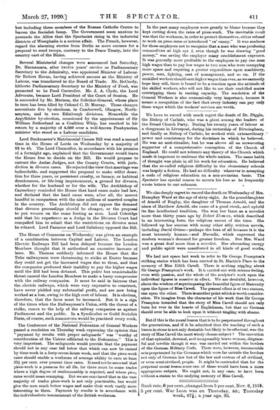The House of Commons on Wednesday was given an example
of a combination between Capital and Labour. The London Electric Railways Bill had been delayed because the London Members thought that it authorized an excessive increase of fares. Mr. Thomas suddenly informed the House that the Tube railwaymen were threatening to strike at Easter because they could not get the increased wages due to them, and that the companies professed their inability to pay the higher wages until the Bill had been debated. This polite but unmistakable threat caused the London Members to make a hasty compromise with the railway companies. It must be said in fairness that the. electric railways, which were very expensive to construct,' have never yielded any substantial profit, and are now being worked at a loss, owing to the high cost of labour. It is-obvious, therefore, that the fares must be increased. But it is a sign of the times. when the Railwaymen's Unien,.with the threat of a strike, comes to the help of the railway companies as against Parliament and the public. In a Syndicalist or. Guild Socialiit State, of course, such manceuvres would be practised every week.


































 Previous page
Previous page